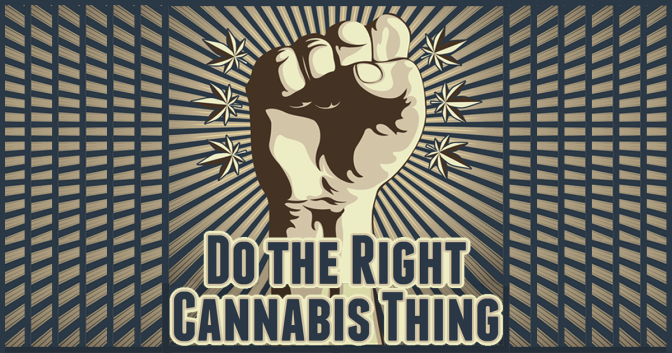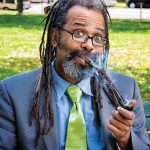Do The Right Cannabis Thing

A fixture on the West Coast weed scene, comedian and activist Ngaio Bealum challenges the industry to “diversify your holdings.”
I’ve been a cannabis activist for more than 20 years. When I first started out, I noticed that activists were a diverse and motley crew, folks of all colors, persuasions, religions, shapes and sizes coming together in the name of social justice (mixed with a bit of enlightened self-interest), challenging city, state and federal laws to create a new reality where marijuana was not an evil drug, but a healthy alternative for many people, and perhaps a gateway to a better society for all.
It all began with the gay community. The healing and comforting effects that medical cannabis had on the victims of the AIDS crisis galvanized an entire community to work toward cannabis freedom. Activists like Brownie Mary and Dennis Peron were instrumental; they didn’t just provide cannabis to people in need, but also pressured city officials to stop arresting people for possessing and using cannabis.
Back then, there weren’t any dispensaries. Marijuana was still an underground thing. I mean, Peron was running a full-on pot shop, but many of us still had to call the weed man, or visit the projects in search of a nickel bag. I remember people being against Proposition 215 (the initiative that legalized medical cannabis in California) because “it didn’t go far enough.” Well, look how far we’ve come.
Activism was a bit easier then, at least in San Francisco, where you could always get a few hundred people to attend a rally. Hell, you could attract a few thousand if you called it a “smokeout” and got a band or two to perform. People love to stand around and smoke weed and listen to music. Throw in a few great speakers (Jack Herer and Ed Rosenthal would usually get the crowd all riled up), invite the local newspaper to take a picture of someone smoking weed on the steps of City Hall, and boom, mission accomplished.
It was around 1992 that I met Debby Goldsberry—she had just started the Cannabis Action Network, which later kind of morphed into Americans for Safe Access—and activists Chris Conrad and Mikki Norris. At that time, we all thought that since Bill Clinton had smoked a little weed in college, he might actually help us legalize marijuana. Not quite: Clinton’s DEA threw so many people in jail for cannabis it wasn’t even funny. But we remained steadfast and undeterred.
After Prop 215 passed in 1996, it was maybe five or six years before the seriously for-profit dispensaries began to pop up around the Bay Area. Before then, it was all done in a low-key speakeasy style. Peron had a giant five-story dispensary in the heart of downtown San Francisco—his third club location—but he was a bit of an outlier. By the turn of the century, however, there were plenty of well-run, community-minded dispensaries/social clubs in the Bay Area, such as Berkeley Patients Group, C.H.A.M.P. (Cannabis Helps Alleviate Medical Problems), the Vapor Room and several others. Every club offered more than just cannabis. Members received all kinds of services including peer counseling and massage therapy, game and comedy nights, live music, potluck dinners and just about any other social activity could be found.

Things have changed a lot. Dispensaries these days aren’t allowed to have on-site consumption, and many are little more than one-stop pot shops. I’m not complaining; back in the day, the Feds raided clubs all the time. Now, the zoning board will send a shop a letter telling them that they’re out of compliance. Letters are better than raids any day of the week.
The idea that a cannabis dispensary is just another business and not a blight on the community has really taken root in California, and law enforcement officials are starting to see the writing on the wall. In fact, the federal government just dropped its longstanding case against Berkeley Patients Group. This is progress.
The battle is not yet over. There’s still work to be done. Until we can have a cannabis farmers’ market in Idaho, hemp grown in the cornfields of Nebraska, no one going to jail for marijuana no matter how much they possess (I could have a semi-truck full of booze in my house and no one would say a damned thing) and the release of all the prisoners of this racist and unjust war on a harmless plant, we have to keep on pushing.
As we stand on the precipice of nationwide cannabis legalization, I would like to give a shout-out to all of the OG cannabis law reform activists who have been waging (and winning) this battle for more than 20 years—people that I know like Peron, Goldsberry, Conrad, Norris, NJ Weedman, Steph Sherer, Sonjia Miles, Vivian McPeak, Radical Russ Belville, Dominic Holden, Don E. Wirtshafter, Steve Bloom, Deborah Smalls, Marc and Jodie Emery, Todd McCormick, Chris Goldstein, Don Duncan, Paul Cheatham and Paul Scott (they opened one of the first dispensaries in Los Angeles), James Anthony and the DeAngelo brothers (Steve and Andrew)—and countless others who have given their time, tears, money and attention to the fight for cannabis freedom. Thank you for your efforts, for your spirit and fearlessness, and for putting your businesses and your freedom at risk in order to fight for a worthy cause.
The cannabis industry is changing. Ten years ago, I had an opportunity to open a dispensary; I declined, mostly out of fear, because I know that the authorities go after minorities first. That’s just how it is. Virgil Grant, who got out of federal prison earlier this year, was incarcerated for owning three dispensaries in L.A. All of his shops were compliant with the laws at that time. Of all the dispensary owners in L.A., he’s the only one I know who received prison time. Grant is a black man, so big surprise.
Now, the city of Oakland is looking for a way to help minorities and those most affected by the War on Drugs to get a head start in the new industry. Portland, Ore., which doesn’t have many black people at all, has more than a few black-owned cannabis businesses. This is also progress.
To all of the “new” (less than 10 years in the biz) folks: Welcome to the cannabis industry! Please remember that cannabis legalization is, first and foremost, a social-justice issue. In your quest to make money, please keep in mind the words of the great American Benjamin Franklin: “Do well by doing good.” It isn’t enough to make money. Anyone can make money. We have to be better than that. We have to use cannabis as a tool for social justice and environmental protection, and to secure the blessings of liberty not just for ourselves, but for future generations.
 Capitalism is fine as far as it goes, but the cannabis industry needs to be about more than just market share and gross profit. I’m asking all you new folks to look around. If your business meetings seem to be a bit monochromatic, fix it. Hire women and people of color. Invest in underserved communities. Go out of your way to find people with cannabis skills that don’t look anything like you. It may be a challenge for some, but it will be worth it in the long run. Studies show that businesses with diverse employees do better and make more money. You want to make more money, right? Diversify your holdings.
Capitalism is fine as far as it goes, but the cannabis industry needs to be about more than just market share and gross profit. I’m asking all you new folks to look around. If your business meetings seem to be a bit monochromatic, fix it. Hire women and people of color. Invest in underserved communities. Go out of your way to find people with cannabis skills that don’t look anything like you. It may be a challenge for some, but it will be worth it in the long run. Studies show that businesses with diverse employees do better and make more money. You want to make more money, right? Diversify your holdings.
The fact that all these rich white folks want to get into the game is proof that cannabis is winning. Our job is to make sure that cannabis wins the right way, and does the right thing. And while it may sound odd, asking stoners to pay attention, it is possible to make the world a better place by advancing the cause of cannabis freedom.
If you enjoyed this Freedom Leaf article, subscribe to the magazine today!

